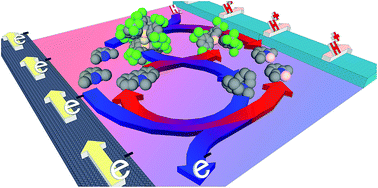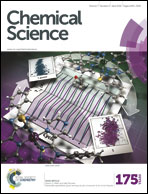Metal-free electrocatalytic hydrogen oxidation using frustrated Lewis pairs and carbon-based Lewis acids†
Abstract
Whilst hydrogen is a potentially clean fuel for energy storage and utilisation technologies, its conversion to electricity comes at a high energetic cost. This demands the use of rare and expensive precious metal electrocatalysts. Electrochemical-frustrated Lewis pairs offer a metal-free, CO tolerant pathway to the electrocatalysis of hydrogen oxidation. They function by combining the hydrogen-activating ability of frustrated Lewis pairs (FLPs) with electrochemical oxidation of the resultant hydride. Here we present an electrochemical–FLP approach that utilises two different Lewis acids – a carbon-based N-methylacridinium cation that possesses excellent electrochemical attributes, and a borane that exhibits fast hydrogen cleavage kinetics and functions as a “hydride shuttle”. This synergistic interaction provides a system that is electrocatalytic with respect to the carbon-based Lewis acid, decreases the required potential for hydrogen oxidation by 1 V, and can be recycled multiple times.

- This article is part of the themed collection: Global Energy Challenges: Electrochemical Energy


 Please wait while we load your content...
Please wait while we load your content...